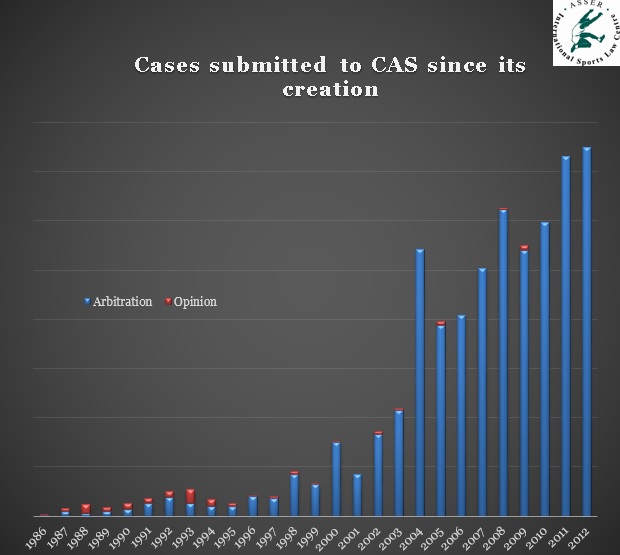Pursuant to Kelsen’s famous pyramid, the authority of norms may be
ranked according to their sources: Constitution is above the Law, which is in
turn superior to the Regulations, which themselves stand higher to the
Collective Agreement etc…Under French labour law, this ranking can however be
challenged by a “principle of favourable treatment” which allows a norm from a
lower rank to validly derogate from a superior norm, if (and only if) this
derogation benefits to the workers.
On 2
April 2014, the Cour de Cassation (the French Highest Civil Court) considered that
these principles apply in all fields of labour law, regardless of the
specificity of sport[1]. In this case, Mr. Orene Ai’i, a professional
rugby player, had signed on 13 July 2007
an employment contract with the Rugby Club Toulonnais (RCT) for two sport
seasons with effect on 1 July 2007. More...

Graph 1: Number of Cases submitted to CAS (CAS Satistics)
More...
Dahmane v KRC
GENK
Court of Labour
of Antwerp (Hasselt district) 6 May 2014
Chamber 2
Algemeen rolnummer 2009/AH/199
The Facts More...
Yesterday, the press revealed
that the European Commission decided to reject the complaint filed by
Jean-Louis Dupont, the former lawyer of Bosman, on behalf of a player agent
Striani, against the UEFA Financial Fair Play (FFP) Regulations. The rejection
as such is not a surprise. The Commission had repeatedly expressed support of
the principles underlying the UEFA FFP. While these statements
were drafted vaguely and with enough heavy caveats to protect the Commission
from prejudicing a proper legal assessment, the withdrawal of its support would
have been politically embarrassing.
Contrary to what is now widely assumed, this decision
does not entail that UEFA FFP regulations are compatible with EU Competition
Law. UEFA is clearly the big victor, but the legal reality is more complicated
as it looks. More...
The UEFA Club Licensing and Financial Fair Play
Regulations have been implemented by UEFA since the season 2011/12 with the aim
of encouraging responsible spending by clubs for the long-term benefit of
football. However, the enforcement of the break-even requirement as defined in
Articles 62 and 63 of the Regulations (arguably the most important rules of
FFP) has only started this year. Furthermore, UEFA introduced recently
amendments to the Procedural rules governing the Club Financial Control Body
(CFCB) allowing settlement agreements to be made between the clubs and the
CFCB.
On Friday 16 May, UEFA finally published the nine
separate settlement agreements between the respective clubs and the CFCB regarding
the non-compliance with the Financial Fair Play (FFP) break-even requirements. More...
Yesterday, UEFA published the very
much-expected settlements implementing its Financial Fair Play (FFP)
regulations. Today, we address tomorrow’s challenges for FFP, we offer five,
more or less realistic, scenarios sketching the (legal) future of the FFP
regulations. More...
Mohamed Dahmane is a professional football player of
French-Algerian origin, who has played for a variety of European clubs,
including French club US Mauberge, Belgian club RAEC Mons and Turkish club Bucaspor.
However, he will mostly be remembered as the player whose legal dispute with his former club (Belgian
club KRC Genk) revived the debate on football players’ labour rights. More...
The Olympic Games are a universal moment of celebration of sporting excellence. But, attention is also quickly drawn
to their dark side, such as environmental issues, human rights
breaches and poor living conditions of people living near the Olympic sites. In
comparison, however, little commentary space is devoted to the views of
athletes, the people making the Olympics. This article
tries to remediate this, by focussing on Rule 50 of the Olympic Charter which prevents
athletes from freely expressing their (political) thoughts. More...
Qatar’s successful bid to host the 2022 World Cup left many people
thunderstruck: How can a country with a population of 2 million people and with
absolutely no football tradition host the biggest football event in the world?
Furthermore, how on earth can players and fans alike survive when the
temperature is expected to exceed 50 °C during the month (June) the tournament
is supposed to take place?
Other people were less surprised when FIFA’s President, Sepp Blatter,
pulled the piece of paper with the word “Qatar” out of the envelope on 2
December 2010. This was just the latest move by a sporting body that was reinforcing
a reputation of being over-conservative, corrupt, prone to conflict-of-interest
and convinced of being above any Law, be it national or international.More...
Since the landing on the sporting earth of the Übermensch, aka Usain Bolt, Jamaica has
been at the centre of doping-related suspicions. Recently, it has been fueling
those suspicions with its home-made scandal around the Jamaica Anti-Doping Commission
(JADCO). The former executive of JADCO, Renee Anne Shirley, heavily criticized
its functioning in August 2013, and Jamaica has been since then in the eye of
the doping cyclone.
More...